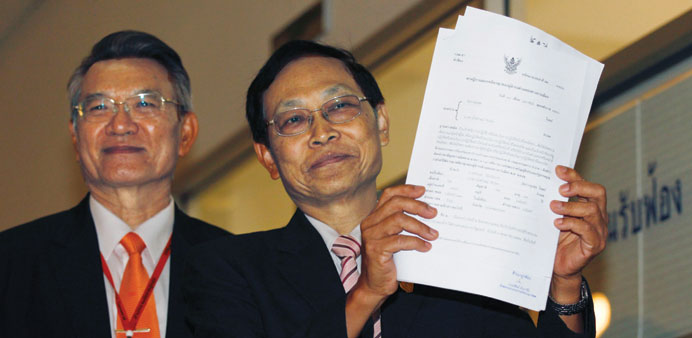AFP/Bangkok
Former Thai premier Yingluck Shinawatra was indicted over a bungled rice subsidy scheme yesterday in the latest legal move against her family that could see her jailed for up to a decade.
Thailand’s junta-stacked government is also considering launching a civil suit against Yingluck, the nation’s first female prime minister, to seek $18bn in compensation for damages caused by the scheme introduced by her government.
The indictment comes after Yingluck was retroactively impeached last month by an assembly appointed by the junta which seized power from her elected government last May.
“We have indicted former prime minister Yingluck Shinawatra... for dereliction of duty” in relation to the costly rice scheme, said Chutichai Sakhakorn, a director-general at Thailand’s attorney general, which filed the criminal charges.
The Supreme Court will decide whether or not to accept the case on March 19.
The ousted premier has been banned from leaving the country since authorities announced she would face charges over the populist subsidy scheme on the same day she was impeached, a move that carries an automatic five-year ban from politics.
Yingluck did not attend the indictment hearing at Bangkok’s Supreme Court but her lawyer Norawit Larlaeng said she had no plans to travel overseas after rumours she might seek to flee the kingdom.
“She will enter the justice process,” he told reporters just before the formal charges were laid out.
Yingluck’s brother, former premier Thaksin Shinawatra, has been in self-exile since 2008 to avoid being jailed for corruption after he was ousted in a 2006 coup.
The ex-premier has defended the rice scheme as a necessary subsidy to help poor farmers who historically receive a disproportionately small slice of government cash.
But while popular among the Shinawatras’ vote base in Thailand’s rural heartlands in the north and northeast, it was economically disastrous and lead to massive stockpiles of the grain.
On Wednesday Finance Minister Sommai Phasee said his ministry had received a letter from the national anti-graft agency asking it to pursue a civil suit against Yingluck to recover losses of $18bn as a result of the scheme.
“The finance ministry oversees damages to the state and is ready to take action,” he said.
The subsidy, which paid farmers in the rural Shinawatra heartland twice the market rate for their crop, cost billions of dollars and inspired protests that felled Yingluck’s government and led to a military takeover on May 22.
The clan draws the loyalty of urban working-class voters as well as farmers, who applaud the family for recognising their changing social and economic aspirations.
Experts say the impeachment and criminal charges are the latest attempt by the country’s royalist elite, and its army backers, to extinguish the political influence of the Shinawatras, whose parties have won every election since 2001.
Since seizing power, Thailand’s military have banned political gatherings, censored the media, arrested and detained opponents and ramped up prosecution under the country’s controversial lese majeste laws.
When asked yesterday about the travel ban on Yingluck, Prime Minister Prayut Chan-O-Cha told reporters his regime was right to impose the restriction and that his powers as junta leader were unfettered.
“I can shut down the media. If someone commits a crime I can even arrest and shoot them dead. But I have not exercised these powers,” he said in a typically splenetic reply to a question about the extent of his authority.
The junta says it will hold fresh elections in early 2016 once reforms to tackle corruption and curb the power of political parties are codified in a new constitution.

Thailand’s Attorney Director General, Department of Special Litigation Chutichai Sakhakorn (right) holds filed charge papers as Director General, Depa
